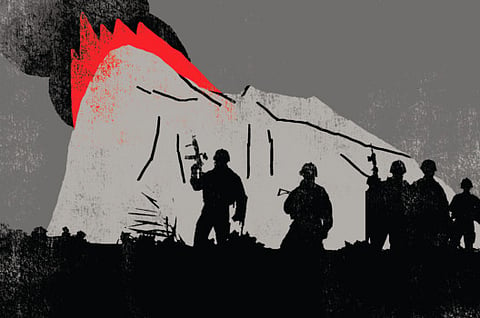Book Review: ‘A Delicate Truth’
John le Carré's latest tale of bungling spooks and cover-ups finds him back on top form

Opening a new Le Carré novel is like stepping into a hushed and well-appointed London club. The tone is English and metropolitan, the mood sombre but enthralling, even intimidating. As readers, we have to be on our mettle, but we also know we will be well cared for by a silver-haired major-domo who has already chalked up more than half a century of dedicated service.
It is exactly 50 years since a young Foreign Office official, and sometime-spy, named David Cornwell woke up to find his alter ego, John le Carré, internationally famous with the publication of “The Spy Who Came in from the Cold”. Macmillan was prime minister; the Cold War with the Soviet Union as dark and bleak as ever. In 1963, the novel of espionage seemed the perfect instrument for examining the soul of a post-imperial society.
Then came George Smiley’s finest hour, a sequence of novels that elevated the spy thriller to an art form — “Tinker Tailor Soldier Spy”, “The Honourable Schoolboy”, “Smiley’s People”. Few English writers of the late 20th century produced fiction to match the Le Carré of these titles.
History was his nemesis. The Wall came down, and the evil empire fell apart. Britain’s secret world found new enemies every bit as nasty as the KGB, and there was no less jeopardy for Le Carré’s romantic antiheroes to confront, but without the drumbeat of communist ideology, the covert wars of the Circus with the outside world seemed mundane.
In his prime, Le Carré had revelled in a Manichean universe of treachery and paranoia. His thrillers of the 1990s — “The Tailor of Panama”, “Single & Single” — were a disappointing coda. With the possible exception of “The Constant Gardener”, post-Cold War Le Carré struggled to gain traction.
Then along came Iraq and the “war on terror”. The writer was on fire again, his indignation rekindled. In the bibliography of Iraq war fiction, Le Carré’s “Absolute Friends” was a cry of rage from a writer in his 70s, but lacking the literary focus of the early work.
Now, at 81, he has achieved a remarkable return to mid-season form. This new novel displays the mastery of the early and the passion of late Le Carré. It is exquisitely narrated, in two time frames that slowly merge. He remains as deeply English in nuance, observation and message as ever, and more perceptive about post-“war on terror” Britain than many lesser writers.
“A Delicate Truth” opens with a classic Le Carré set-piece, Operation Wildlife, a top-secret mission to the rock of Gibraltar, involving CIA, special forces, and a cast of spooks familiar to his regular readers. The British government’s covert seizure of an arms-dealing Mr Big is seen through the eyes of that stock-in-trade, the quintessential Englishman, a certain Paul Anderson. But Wildlife was “an utter cock-up” in which two innocent people, a Muslim mother and child, were killed.
Three years later (it is now 2011), one of the soldiers involved reveals that the greater horror of the “cock-up” is the government conspiracy to cover it up, and bury the truth. “Paul Anderson” turns out to be a retired diplomat, Sir Kit Probyn. Together with FO high-flyer Toby Bell, this elderly and confused Englishman slowly comes to terms with the moral challenge presented by the Wildlife disaster. The stage seems set for a set-piece finale.
Le Carré, however, is never predictable, and always exploring new frontiers. A lesser writer might have fallen back on some literary tradecraft. Once the cat is out of the bag, the tempo and tone of “A Delicate Truth” becomes progressively relentless and angry. Le Carré picks over the cynicism of the secret state with a kind of cold fury. There is a brilliant climax, with sinister deaths, casual torture, wrecked lives, and shameful compromises.
In the end, Anderson/Probyn and his dogged FO mole, Toby Bell, uncover the truth about the cock-up, but find themselves helplessly trapped in the larger conspiracy. The forces of covert coercion close in, with blaring sirens. If the bleak despair of Le Carré’s conclusion has warmth, it is derived from the heat and velocity of its author’s rage.
–Guardian News & Media Ltd
Sign up for the Daily Briefing
Get the latest news and updates straight to your inbox



